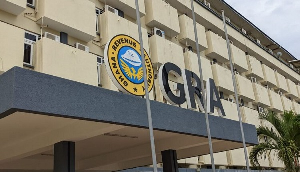The new Cedi currency denomination Change in Ghana: Transition has been smooth
New denominations and notes of Ghana’s currency, the Cedi, were introduced in Ghana from July 3, 2007. The exercise which was announced in December 2006 is aimed at eliminating the hazard and inconvenience in carrying large sums of currency notes for business transactions. Four zeros were pruned from the old denominations. The new currency notes are in five denominations: One, Five, Ten, Twenty and Fifty Cedi notes and five coin denominations of one, five, ten, twenty and fifty pesewas. Under the new denominations, the old ten thousand Cedi becomes the new One Ghana Cedi which means that the new ten Cedi notes can pay for the equivalent of the old one hundred thousand Cedis while the new Fifty Cedi note is equivalent to the old Five Hundred Thousand Cedis. The one new pesewa coin is equal to the old one hundred cedi while the new Fifty pesewa coin represents the old Five Thousand Cedi note.There was a lot of anxiety about the move when the Bank of Ghana announced the new designations in December 2006. With the painful lessons and losses associated with previous currency change-overs looming in people’s minds, the fear was that citizens were going to lose out again with this new currency exercise. Two major currency exercises have been undertaken by the military governments of yester-years with disastrous consequences on the population. In 1978, just after General Akuffo and his military commanders ousted General Kutu Acheampong in a palace coup to usher in the SMC II regime, the government announced a currency change to mop out what they termed “excess liquidity” in the nation’s monetary system. Under the personal direction of Lt. General Odartey Wellington, the exercise was undertaken in utter chaos and total confusion. People had to travel long distances from the countryside to camp out overnight in front of the commercial banks to have their currency notes exchanged for the new ones. Many were robbed by unscrupulous Bank officials. Others were robbed by criminals as they slept in front of the Bank premises or as they left the banks. Many others, especially the rural folks, simply gave up. They were too tired, frustrated and terrified by the chaos to even make further attempts at changing their hard-earned money.
Another, more inhumane currency exercise was undertaken by the military guys in 1979, this time under Jerry Rawlings’ AFRC short-lived regime. Also citing “excess liquidity” in the monetary system (I believe that is only term that the soldiers know), Rawlings and his AFRC ordered that every citizen in possession of a Fifty Cedi note, (the highest denomination at the time), should surrender them with “immediate effect” to the Banks or be “subjected to instant revolutionary justice”. Citizens turned over these notes to the banks and got nothing in return. The idea was that anyone holding a Fifty Cedi note was rich and rich people at the time were deemed by Rawlings and his AFRC rogues as “enemies of the revolution”. Many citizens were too terrified to show up with their Fifty Cedi notes for fear of being subjected to what you know is the real meaning of “instant revolutionary justice”: being stripped naked, (male or female), being matched under the scorching sun to be caned at bus stations or being shot on sight. Citizens therefore kept their Fifty Cedi notes and lost their life-time savings, business and farming earnings. My old mother has never forgiven Jerry Rawlings for making her lose her proceeds from the sale of her corn harvest in the summer of 1979. Despite declaring that it was a crime punishable by “instant revolutionary justice” to own a Fifty Cedi currency note, Jerry Rawlings turned round and introduced new currency notes in his “Second Coming” under the PNDC regime in one, two, five and ten thousand notes. The possession of Fifty Cedi notes was criminal in 1979 but the creation four years later of notes as high as ten thousand was not criminal. This amounts to what Dr. Jones Ofori Attah calls “Kwaseabuo par excellence”.
Fast forward to 2006: Government critics, especially the opposition NDC political party, did their best to stoke and hype people’s fears about the motives of the government and the impact of the introduction of the new currency denominations. The NDC charged that the currency change was a sinister attempt by the government to “steal” people’s money to rig the elections in 2008. How low can people sink for cheap political purposes?
And bingo July 3, 2007 comes!! The new currencies hit the market. Earlier public education undertaken by the Bank of Ghana through the National Commission on Civic Education really worked. The popular slogan you hear everywhere in the country on the new currency is “the value is the same”. Yes the value is the same. I traveled around the country: Greater Accra, Eastern, Central and Ashanti Regions and it was so refreshing to note the ease with which people were transacting business in both old and new currency denominations. Even in the rural areas, farmers and hawkers were accepting the new currency denominations with no complaints. You ask the prices of foodstuffs. They are usually quoted in the old denomination, but after you agree on a price of one hundred thousand cedis, you can either pay with the old currency or the equivalent of Ten new Ghana Cedis: the value is the same. The side-by-side transaction in old and new denomination will last until December 31, 2007 after which time the old notes will no longer be legal tender.
The new currency looks good and so convenient to carry. Unlike previous times when you needed to carry a “portemanteau” or identifiable black polythene bags to carry ten million Cedis, you can now put ten million Cedis of the new currency in your wallet. Its so refreshing. The only “complaints” you hear from people is that “Sika fofro no sunsum nnim” (The new currency has no spirit) Why? The simple truth is that during the time of the old currency, everybody in Ghana was a millionaire. It is just the loss of the millionaire status that people are mourning. Apart from that there are no complaints. The government, Bank of Ghana and all public agencies who worked on the introduction of this currency denomination and the public education that led to its introduction should be commended for a good job done.
















